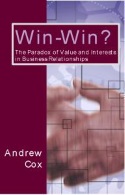Win-Win? The Paradox of Value and Interests in Business Relationships

Price: £40.00
Author: Andrew Cox
Format: Hardback
No. Pages: 295
Published: December 2004
ISBN: 1-873439-22-9
For most people a win-win means that both parties receive something that they value from an exchange or relationship. The problem with this definition is that it does not really define what a win-win means in practice. This is because, if both parties subjectively believe that an outcome is a win-win, then, by definition, it must be. This is tautological reasoning because it provides no basis for an objective explanation of what a win-win does, or does not, mean in practice.
Based on an understanding of objective economic interests this volume outlines for the first time what a win-win means in business relationships between joint venture and strategic alliance partners, as well as between buyers and sellers. The book also shows, paradoxically, that, while a win-win may be feasible in joint ventures and strategic alliances, it is not at all feasible in relationships between buyers and suppliers. Furthermore, it is argued that symmetrical outcomes are not necessary to sustain relationships in business, and that most are actually sustained with asymmetric outcomes (i.e. when one party achieves more than another).
The volume also shows that many managers suffer from a form of economics false consciousness about their objective commercial interests, and that this subjectivism provides scope for opportunism in business relationships. The book concludes with a discussion of this insight for current academic theories about the centrality of the exchange transaction for understanding economics and business performance. This provides a basis for a new theoretical synthesis about exchange that uses the concept of power to link recent governance, resource-based and political economy explanations into a new theory of transactional exchange in business and economics.








If you would like to purchase this book please contact us or visit your local Amazon.